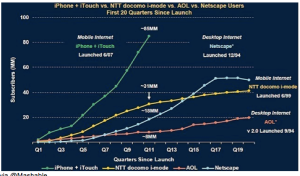Mobile Internet is Making the Commercial Real Estate Industry Move
By Riggs Kubiak May 13, 2014 4:38 pm
reprints Mobile usage is exploding. Last year’s mobile data traffic was nearly 18 times the size of the entire global Internet in 2000 and by 2015, the mobile web is expected to eclipse the desktop Internet on a global scale.
Mobile usage is exploding. Last year’s mobile data traffic was nearly 18 times the size of the entire global Internet in 2000 and by 2015, the mobile web is expected to eclipse the desktop Internet on a global scale.
Given this data, it’s no surprise that so many are latching on to mobile. What is puzzling is why so many real estate organizations are moving at a snail’s pace when it comes to capitalizing on this trend. However, there are several factors driving the evolution to mobile:
Industry Frontrunners
Real estate technology firms are leading the adoption of mobile in the industry. Companies like View the Space, HighTower, 42 Floors, CompStak, Field Lens (and of course, Honest Buildings), show us a more efficient way of getting business done. These companies (and other emerging businesses) understand the importance of applications, but also see great potential in capitalizing on the mobile web and potentially reaching more than 1.2 billion people.
Consider this: The mobile web is akin to the lobby of a building. If your lobby isn’t kept up-to-date, what kind of first impression are you giving tenants? Can you really expect your space to lease at market rate?
If you look at it from this perspective, it’s shocking that more companies have not optimized their web presence. Just as savvy professionals in commercial real estate know that a great lobby can support strong leasing activity, the industry must also recognize that mobile is the new gateway for company brands and positioning.
The Changing Office
Office space usage is among the best examples of how mobile is impacting the business of real estate. What we’re seeing is a major shift in the way that people work now that desktop computers have become baggage, literally and figuratively.
The increased use of mobile technology and work arrangements has enabled companies to become more efficient in the amount of office space they need for their business operations. In fact, 13.4 million people, or 9.4 percent of U.S. workers, work remotely at least one day a week (a figure that continues to rise).
The look and feel of office space continues to evolve. Technology and mobile has encouraged a rise in “open offices,” where employees are no longer constrained by walls and doors, instead encouraged by collaborative, flexible spaces that require fewer feet per employee.
Ease of Use
The Internet and rise of mobile devices is starting to touch all corners of the real estate landscape. Why? It’s as simple as this: Because it makes our lives easier in the long run. And while real estate still very much thrives on face-to-face interactions, mobile allows us to take our work with us everywhere we go. For industry professionals that travel from building to meeting room to work site–and there are many that do–mobility is key to professional flexibility.
In the near future, mobile will not be an accessory, it will be a necessity. Are you ready?
Riggs Kubiak is the CEO and founder of Honest Buildings (HB), the world’s leading Connection Engine for Real Estate Projects. From architects to engineers, contractors to technology experts, HB helps professionals find and meet the perfect people for their real estate projects, fast. With an innovative suite of products and more than $155 million in deal flow to date, HB is changing the way real estate connections are forged.



